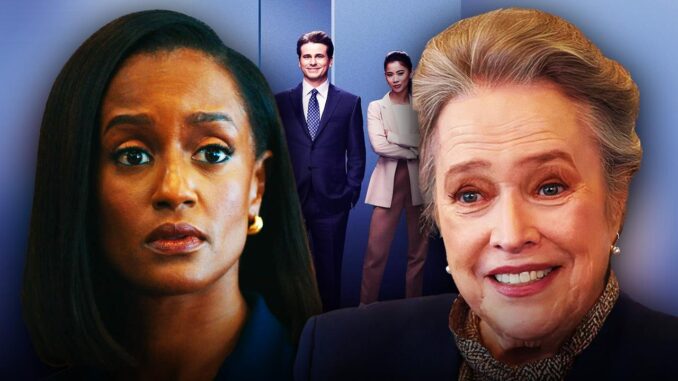
The Unyielding Gavel: Kathy Bates Returns as Matlock's Legacy
The whispers began as a faint internet rumor, gaining momentum with each retweet, until the official announcement thundered through the television landscape: "Matlock" was returning in 2024, and at its helm, with a gavel forged anew, was the formidable Kathy Bates. For a generation accustomed to Ben Matlock's folksy charm and yellow suit, the news was both electrifying and a little disorienting. How would Bates, an actress synonymous with raw intensity and layered complexity, interpret a character etched in comfort and predictable wit? The answer, as the plot unfolded and the main character's fate was revealed, proved to be a masterful reimagining, not merely a reboot, but a profound evolution of the Matlock legacy.
Kathy Bates steps into the shoes of Abigail “Abby” Matlock, Ben's fiercely independent grand-niece, a seasoned public defender whose career has been spent in the trenches, fighting for the underrepresented with a tenacity that makes her more bulldog than bloodhound. Unlike her great-uncle, Abby isn't driven by the thrill of the chase or the satisfaction of a clever reveal; she's fueled by a simmering, righteous anger at systemic injustice. Her office isn't a plush, oak-paneled sanctuary but a cluttered, perpetually coffee-stained space in a nondescript downtown building, reflecting a life lived on the sharp edges of the law. Bates imbues Abby with a weary gravitas, her eyes holding the stories of countless lost causes and hard-won victories, yet capable of sparking with an almost terrifying intensity when injustice rears its head. She trades folksy charm for biting sarcasm, and her courtroom theatrics are less about grandstanding and more about dismantling the opposition with surgical precision.
The central plot of "Matlock 2024" revolves around a case that rips through the veneer of a seemingly progressive tech-utopia city. A prominent climate scientist, Dr. Aris Thorne, a young, idealistic Black woman, is accused of orchestrating a series of eco-terrorist bombings that target the data centers of a powerful, climate-denying tech conglomerate, "ChronoLogic." The evidence against her is overwhelming: forensic data placing her at the scenes, incriminating emails, and a motive rooted in her outspoken activism. The public and media have already convicted her, painting her as a radical villain. Abby, however, sees beyond the sensational headlines. She takes the case not because it's a guaranteed win, but because something in Dr. Thorne's defiant, yet utterly bewildered, eyes screams "framed."
Abby's investigation is less about chasing physical clues and more about navigating a labyrinthine web of digital deception, corporate espionage, and a justice system increasingly swayed by public opinion and algorithmic narratives. Her classic Matlock methods are updated: instead of interviewing neighbors, she's sifting through encrypted servers; instead of charming small-town sheriffs, she's sparring with cyber forensics experts and ruthless corporate lawyers. She pulls in a motley crew: a brilliant but socially awkward hacker named "Byte," and a jaded, street-smart private investigator who knows the city's underbelly better than anyone. Bates's Abby, rather than simply solving the crime, peels back layers of corporate malfeasance, exposing how ChronoLogic used Dr. Thorne's identity to stage the attacks, generating public outcry against environmental activism, while simultaneously developing illegal AI-driven systems designed to manipulate weather patterns for profit. The real masterminds are not just the CEO, but an entire shadowy division within the company.
The fate of Abby Matlock is revealed in the crucible of the trial. As she relentlessly exposes ChronoLogic's monstrous scheme, putting her own life at risk from their powerful reach, the personal toll becomes evident. The show culminates not just in Dr. Thorne's acquittal, but in a moment of profound introspection for Abby. She wins the case, shattering ChronoLogic's carefully constructed narrative and bringing their executives to justice, but the victory feels hollowed by the sheer scale of the corruption she uncovered. In the final scene, she stands in her cluttered office, the weight of the triumph and the lingering bitterness of the fight etched on her face. Her initial ambition was to simply save the innocent, but this case has broadened her gaze.
Her fate is not retirement or a return to quiet obscurity. Instead, it is a transformation. Abby Matlock realizes that the fight for justice in 2024 is no longer about individual cases alone, but about dismantling the very structures that enable such profound deceit and injustice. She decides to use her newfound, grudging celebrity to advocate for systemic change, to mentor a new generation of legal minds who understand the intersection of law, technology, and social justice. The weary warrior finds a renewed, perhaps even fiercer, purpose. Kathy Bates's Abby Matlock doesn't just return; she redefines the role, embodying a more cynical, yet ultimately more profound, dedication to truth in a world that desperately needs an unyielding gavel to cut through the noise. Her legacy, like her great-uncle's, becomes etched not just in clever courtroom victories, but in the enduring spirit of defiance against the Goliath of injustice.
